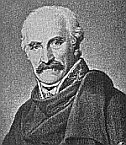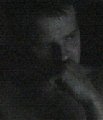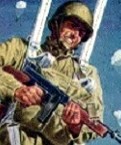Greyshaft
Posts: 2252
Joined: 10/27/2003
From: Sydney, Australia
Status: offline

|
Tom Cruise wins the Battle of Britain? I thought you were joking, but alas no...
http://enjoyment.independent.co.uk/low_res/story.jsp?story=510475&host=5&dir=215
Hollywood updates history of Battle of Britain: Tom Cruise won it all on his own
The 'Top Gun' star is making a new film glorifying American Billy Fiske as the hero of this country's 'finest hour'. But veterans say that, though a remarkable man, Fiske died without shooting down a single plane. Cole Moreton talks to those who knew him
11 April 2004
Billy Fiske was a racing driver, a pilot, an Olympic gold medallist and an American - but one thing he did not do was win the Battle of Britain single-handed. Veterans and historians fear that will be the impression given, however, when Tom Cruise plays Fiske in a new film called The Few.
"I've heard it is almost like he won the war all on his own," says Ben Clinch, who loaded the guns fired by the real Billy Fiske and his comrades in 601 Squadron during the summer of 1940. "I can't see how they can make a film of Fiske's life. It was quite short. He was unremarkable, in the context of the squadron. He was just another pilot as far as we were concerned."
Hollywood's version of the Second World War has already shown Americans capturing the Enigma code machine in U571 (they didn't) and leading The Great Escape from a German prisoner of war camp (also not true). Pearl Harbor even suggested that the RAF only thwarted the Luftwaffe in the summer of 1940 because US pilots popped across the Atlantic to help out. Now Mr Cruise looks set to expand on that with his own version of what Churchill called our "finest hour".
Fiske was a remarkable character who did fly in the Battle of Britain, but recorded no confirmed kills. "It is going to be a farce if we have the Yanks shooting down everything in sight," says Bill Bond of the Battle of Britain Historical Society. "The battle was four weeks old when Billy was shot down. He made several sorties but he didn't shoot anything down, and his impact on the battle was negligible. We are concerned."
The Few is being made by Michael Mann, director of Top Gun, the jet-fighter movie that made Tom Cruise's name. Currently in development, it will be based on the life of William Meade Lindsley Fiske III, son of a wealthy Chicago family, who became the youngest Winter Olympics contestant to win a gold medal, in the bobsleigh at the age of 16. Handsome, charming and addicted to speed, he married the former Countess of Warwick and raced at Le Mans. So far, so historical, and filmable. But alarm bells started ringing when Variety, the movie world's magazine of choice, described the film's historical content. "In 1940, expert German fighters had decimated the Royal Air Force to the point that there weren't enough pilots left to fly the Spitfire planes sitting idly in hangars," it said. "Unable to rouse the US into action, a desperate Winston Churchill hatched a covert effort to recruit civilian American pilots to join the RAF. Risking prison sentences in the then-neutral US, a ragtag bunch of pilots answered the call." The magazine also looked forward to "ferocious dogfights between the overmatched American pilots and the German ace fliers".
This account prompted despairing laughter from Bill Bond last week. "It's hilarious," he said. "Totally wrong. The whole bloody lot. They flew Hurricanes for a start." Spitfires have a more romantic image, however. "Recruited by Churchill? Crap. They wouldn't have gone to prison either." And as for the idea of aircraft sitting idly by in hangars while the brave Americans took to the skies: "What a load of bloody rubbish. We did have a pilot shortage, but not to that extent."
Mr Bond has much more confidence in the accuracy of a forthcoming book by the author Alex Kershaw, whose proposal was the inspiration for The Few. The book is due to be published by Michael Joseph next year. Mr Kershaw also wrote The Bedford Boys, the basis for the film Saving Private Ryan.
There was no crack American squad of flyers, but at least nine US citizens did fly and fight during the Battle of Britain, according to the aviation historian Andy Saunders. "It would be an injustice to the memory of Billy Fiske were Hollywood to corrupt his story," said Mr Saunders in a recent edition of Aeroplane magazine. Although a gifted pilot, Fiske was frustrated by his own lack of combat action. His Hurricane caught fire in the air on 16 August 1940, but nobody knows whether this was because of enemy bullets or an accident. Soon after he landed, his airfield, RAF Tangmere, was attacked by Stuka bombers. Fiske died in hospital the next day from his burns.
Two other American pilots had been killed before him, but it was the dashing, well-connected Fiske who caught the public imagination - or was recognised as useful for propaganda purposes. Churchill sent a wreath to his airfield, and in July 1941 a plaque was unveiled by the Minister for Air at St Paul's Cathedral. His gravestone at Boxgrove in Sussex was replaced and rededicated in 2002.
"There is no doubt the Few, as Churchill called them, were wonderful," said Ben Clinch, now chairman of the 601 Squadron Royal Auxiliary Air Force Old Comrades' Association. "They gave their lives without thought. It's a good job they were there."
But his memories of the time are very different to those told in heroic movies: 601 was nicknamed the Millionaire's Squadron because most of its pilots moved in high social circles. "They were very aloof," said Mr Clinch.
When petrol rationing hit hard, one of the wealthy flyers bought a local garage outright, he said. "We used to get visits from theatrical types from the West End. The stars went to see the officers. The chorus line went to the non-commissioned officers. We got nothing."
Mr Clinch saw Billy Fiske's Hurricane land for the last time but took cover as buildings around him exploded. He has a print of a painting on his wall that shows one version of Fiske's last moments, but at 85 he is bemused by the attempts to immortalise this one of many pilots. "This resurrection is commercial, as far as I can see," he said. "But at my age I let sleeping dogs lie."
HOW UNCLE SAM REWROTE THE SCRIPT
Objective, Burma! (1945)
Errol Flynn's paratroopers overcome the Japanese with barely a Brit in sight, although it was really they who won the battle. The press and public, some of whom had fought in Burma, were so outraged that the film had to be withdrawn.
The Great Escape (1963)
Steve McQueen played a leading part in a mass escape from a POW camp. In real life, 76 got out of Stalag Luft III, but only three made it alive; 50 were shot and 23 recaptured. No Americans among them.
Braveheart (1995)
Mel Gibson as a charming William Wallace - not the real man who wore the skin of an opposing general as his belt. Wallace fathers a son by the Princess of Wales who really gave birth seven years after his execution.
Titanic (1998)
First Officer William McMaster Murdoch is remembered as a hero in his Scottish home for saving passengers. He froze to death in the sea. The film shows him shooting passengers in a blind panic.
U-571 (2000)
Harvey Keitel and other plucky American seamen pull an Enigma code machine from a sinking German submarine and change the course of the war. Except that it was the crew of HMS Bulldog.
The Patriot (2000)
Gibson again as a pacifist provoked into joining the American War of Independence when sadistic Brits herd women and children into a church and set fire to it. Nothing like that happened.
|
 Printable Version
Printable Version





 . Well, since it hasn't been mentioned I'd go for 'Raid on Rommel' starring Richard Burton. But it's only Burton in the close-ups, most of the longer shots are unused footage of George Peppard in 'Tobruk' (I think). Even allowing for that it's still a total farrago.
. Well, since it hasn't been mentioned I'd go for 'Raid on Rommel' starring Richard Burton. But it's only Burton in the close-ups, most of the longer shots are unused footage of George Peppard in 'Tobruk' (I think). Even allowing for that it's still a total farrago.




 . Think its due out sometime in 05.
. Think its due out sometime in 05. 









 (Sorry I'll clear that mess up in a minute when I recover
(Sorry I'll clear that mess up in a minute when I recover )
)

 New Messages
New Messages No New Messages
No New Messages Hot Topic w/ New Messages
Hot Topic w/ New Messages Hot Topic w/o New Messages
Hot Topic w/o New Messages Locked w/ New Messages
Locked w/ New Messages Locked w/o New Messages
Locked w/o New Messages Post New Thread
Post New Thread